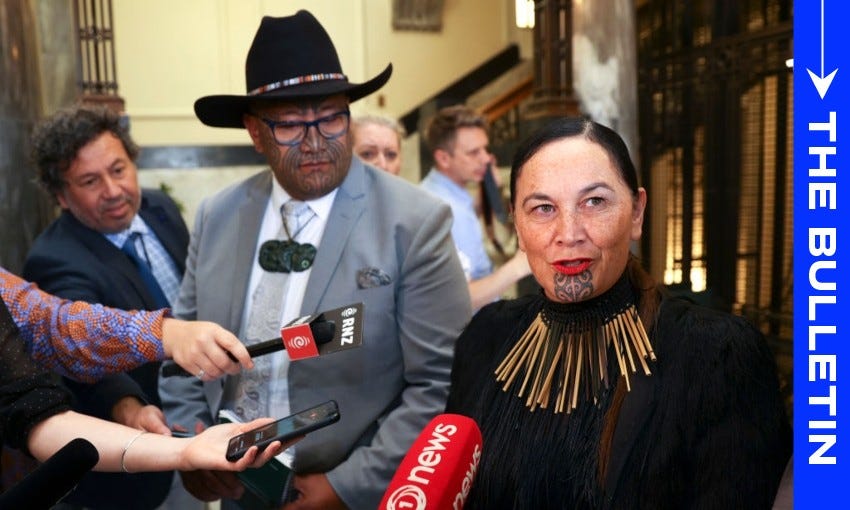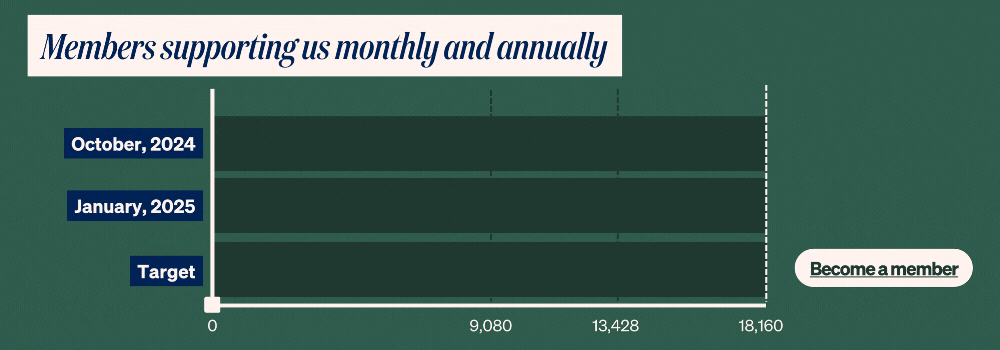Te Pāti Māori's ultimatum poses a challenge to Labour
A new poll shows the left bloc is back in the driving seat. With that comes the promise of bottom lines.
Mōrena, and welcome to The Bulletin for Wednesday, February 5.
In today’s edition: Kāinga Ora refocused on more affordable homes, corporate tax cuts on the cards for Budget 2025, and what the Ted Cruz tweet-storm says about our strange new “information space”. But first, the stage is set for a fiery day at Waitangi.
Electioneering starts early
Talk of “bottom lines” for the next election has seemingly already started, with Te Pāti Māori announcing at Waitangi that it will campaign on the creation of a new te Tiriti commissioner with extraordinary power. As Stuff’s Glenn McConnell reported, the commissioner would carry a “Tiriti veto” – effectively, the ability to stop any piece of legislation in its tracks should it not comply with the Treaty. The party’s co-leaders said the creation of the “full time watchdog” was about ensuring Māori self-determination, but it also poses a significant challenge to any prospective coalition parties. Two recent polls have shown Labour outpacing National for the first time since the election, the latter of these, from Talbot Mills, showing the left bloc would be able to govern. That means Labour will have to seriously consider demands from Te Pāti Māori made in the run up to next year’s election. RNZ reported that Labour leader Chris Hipkins wasn’t ruling in or out the possibility of a new commissioner, suggesting it wouldn’t be able to overrule parliament, while Act called for the opposition to end any speculation and called the policy anti-democratic.
The Kīngitanga returns to Waitangi
Writing for The Spinoff this morning, Liam Rātana said Te Pāti Māori’s push for a new commissioner “aligned closely” with sentiment from some speakers at Waitangi yesterday, as Kuīni Ngawai hono i te po was welcomed to the Treaty grounds for the first time as Māori monarch. “As Te Pāti Māori continues its quest for mana motuhake within parliament, the Kīngitanga and Kuīni Ngawai hono i te po carry forward the legacy of kotahitanga – a cause Kīngi Tūheitia championed throughout his reign,” Rātana wrote.
The arrival of the Māori monarch – the second successive visit to Waitangi by members of the Kīngitanga – was significant, explained Rātana. Some see Kuīni Ngawai as one day being capable of having enough influence to sway government policy. RNZ’s Ella Stewart has a good write-up on how the formalities played out yesterday, with speeches focused on unity.
‘Hard kōrero’
Just how long that unity will survive remains to be seen. As we discussed yesterday, while opposition parties have been capitalising on the mood at Waitangi ahead of the formal commemorations, the arrival of the government today could quickly shift the mood. As Lyric Waiwiri-Smith writes for The Spinoff, the absence of the prime minister also opens up a chance for the other two heads of the coalition to carve out their own positions on the relationship between Māori and the Crown.
Christopher Luxon’s place on the Treaty grounds will be taken by Māori development minister Tama Potaka, reported Waiwiri-Smith. He’s anticipating “hard kōrero, but also a welcoming atmosphere”.
Protest anticipated
As Waiwiri-Smith noted, New Zealand First ministers Winston Peters and Shane Jones are likely to receive a reasonably warm reception today, owing to the strength of their relationship with the North. The presence of Act’s David Seymour is expected to be less welcome. His own hapū, Ngāti Rēhia, had asked him to stay away from Waitangi. RNZ’s Jo Moir and Lillian Hanly reported that a protest group will make itself known during today’s pōwhiri. Seymour has anticipated this, saying he will release his speech in advance “so that anyone who's truly interested in a dialogue can see what I went to say”.
Waitangi organisers, however, remain hopeful that protesters won’t disrupt the day, reported the Herald’s Adam Pearse. At least, won’t disrupt proceedings too much. “Protest by its very nature is aimed at a degree of disruption and as long as we’re able to carry out our obligations as a host, that’s fine,” said Waitangi National Trust chief executive Ben Dalton.
Have thoughts? Join the conversation in the comments.
Bryn & Ku’s Singles Club – Coming soon to The Spinoff
Join comedians Brynley Stent and Kura Forrester on their cross-country quest to find love in a hopeless place: Aotearoa, New Zealand.
Bryn & Ku’s Singles Club is a new documentary series that follows two best friends on a road trip like no other as they connect with New Zealanders from all walks of life over matters of the heart. Will they find what they are looking for at the bottom of a beer funnel on Castle Street, or find plenty more fish in the sea off Rakiura? You’ll have to join the club to find out.
Episode one premieres Tuesday February 11 on The Spinoff. Watch the trailer below.
Kāinga Ora refocused on fewer, more affordable homes
The country’s social housing agency Kāinga Ora will be tasked with building fewer, more affordable houses under the government’s cost-cutting “turnaround plan”. This will include buying or building 1,500 homes, offset by demolishing 700 homes and selling another 800, reported Interest’s Dan Brunskill, contrasting with a net increase of 3,600 homes in the year ending June last year. Housing minister Chris Bishop said that while Kāinga Ora had built a number of new homes in recent years, “many of them [were] at a high cost and some of them in the wrong places”. He pointed at a lack of new one-bedroom properties, noting that many on the social housing wait list needed smaller homes. The agency also owned about 200 homes valued at more than $2 million, which will be sold. Labour’s Kieran McAnulty said promising that the number of homes wouldn’t decrease wasn’t good enough. “It shows their priority is cutting spending, not housing people.”
More reading:
Homelessness to get worse under new Kāinga Ora plan, housing provider warns (RNZ)
Why public housing is under threat from the debt narrative (The Spinoff)
We still need your help
Our extensive coverage of Waitangi 2025 – powered by the nearly 16,000 people who give to us on a monthly or annual basis or who have donated as a one-off – would have been unimaginable before so many of you met our honesty with your generosity after our open letter in November.
We still need 4,500 new members to join us this year to ensure our future so we can continue the comprehensive, rigorous and thoughtful coverage of the things that matter to our audiences.
Please, if you value comprehensive coverage of Waitangi and te Tiriti issues, and you’ve let your membership lapse, make this week the week you sign up again.
Corporate tax cuts on the cards for Budget 2025
The government is gearing up for May’s budget, with both the prime minister Christopher Luxon and finance minister Nicola Willis making it clear that tax reform is being considered. Speaking to The Post’s Luke Malpass, Willis said that while cabinet had not yet agreed to specific Budget 2025 policies, “it seems important to me that we put tax on the table and consider what kind of a country do we want this to be”. The country’s corporate tax rate, in particular, is in the spotlight given the government’s growth agenda. “When you look at New Zealand compared to other countries in the developed world, over time, our tax settings have become less competitive,” Willis said. In an interview with Newstalk ZB’s Mike Hosking yesterday, Luxon also floated corporate tax cuts but was coy on exact details. “We are looking at different taxation measures to stimulate economic growth.”
More reading:
NZ can’t afford economically dubious corporate tax cuts – experts (Newsroom Pro, paywalled)
Nicola Willis talks up business-friendly tax tweaks ahead of Budget 2025 (NZ Herald Premium, paywalled)
Join us live in 2025
We have four fantastic live events in 2025. Join us in Auckland and Wellington for The Spinoff Live!
Auckland at Q Theatre: Bryn & Ku’s Singles Club Party, February 13 and Gone by Lunchtime Live, April 9.
Wellington at the Hannah Playhouse: The Fold Live, February 20 and The Spinoff Book Club, March 13.
How the Ted Cruz tweet-storm encapsulates our strange new ‘information space’
Duncan Greive considers how the decay of institutional media and immense power of social media combine to open a window into the complex communications world we’re living in.
Two stories, both on highly-read Israeli news sites, both understandably attracting huge traffic. One amended, the other very much still live. As is the tweet from Cruz, which has been viewed over 1.3m times. An uneasy mix of social media’s enormous distribution power and what appears to be a reporting and editing failure.
To support work like this, consider becoming a Spinoff Member.
Click and Collect
The conversations, commemorations and celebrations taking centre stage at Waitangi.
Realtor Janet Dickson loses challenge over compulsory Māori values course.
Government looks to narrow list of shipbuilders to strike a deal on new Cook Strait ferries.
Sticking with the topic of tax and investment: Meet the Silicon Valley mogul who wants to be a Kiwi, and the tax stopping others from doing the same.
Nearly 100 companies went bust in New Zealand last month – the busiest January in nearly a decade as the rate of liquidations continues to rise.
For Newsroom Pro subscribers: New Mainland minister lays out main goals. (paywalled)
The Spinoff Review of Books updates a reading, watching and listening guide for those who want to learn more about te Tiriti. Chris Tse meditates on what it was like to grow up behind the counter of Queensgate Mall's first Chinese takeaway. Liv Sisson reviews the David Sedaris show, featuring pantaloons and pesky fact-checkers. Duncan Greive and Toby Manhire discuss the weirdness of the Ted Cruz tweet affair in an online information space. For The Cost of Being, a teacher keen to grow his property portfolio breaks down his expenses.
That’s it for today, thanks for reading. I’m off for the rest of the week but join Anna Rawhiti-Connell for post-Waitangi analysis bright and early on Friday.
Want to get in touch? Join the conversation in the Substack comments section below or via email at thebulletin@thespinoff.co.nz if you have any feedback on today’s top stories (or anything else in the news).
If you liked what you read today, share The Bulletin with friends, family and colleagues.





















There are so many problems with yesterday's announcements around Kāinga Ora. One issue is that the decision-making is driven by a false narrative driven by a poor, crony-run review. As Dwell Housing Trust CE Elizabeth Lester said in a piece from RNZ, "the agency should not be run like a profit-making organisation". Many commentators have noted the scope for the Government to take on more debt, and if it can be used to provide housing - something the WHO identifies as a basic human right - for our most vulnerable, then that's a good thing.
In his interview with Lisa Owen on Checkpoint, Chris Bishop highlighted the need for better data to drive decision-making (e.g., where homes are built and who lives in them), but Kāinga Ora has made most of its information and data governance teams redundant!
The fact is, the majority of people needing access to social housing require a home that is above the bare minimum Building Code standards (e.g., homes built to universal design standards, accessible homes, or homes that accommodate multi-generational whānau from different cultures). In light of this fact, *of course* Kāinga Ora homes are going to cost more!
I'm kind of horrified that there's nothing about the ongoing coup in the USA here; the Cruz thing is old news at this point, and Musk has inexperienced engineers with total control of some of the most important systems in the USA, no oversight, and no effective pushback.